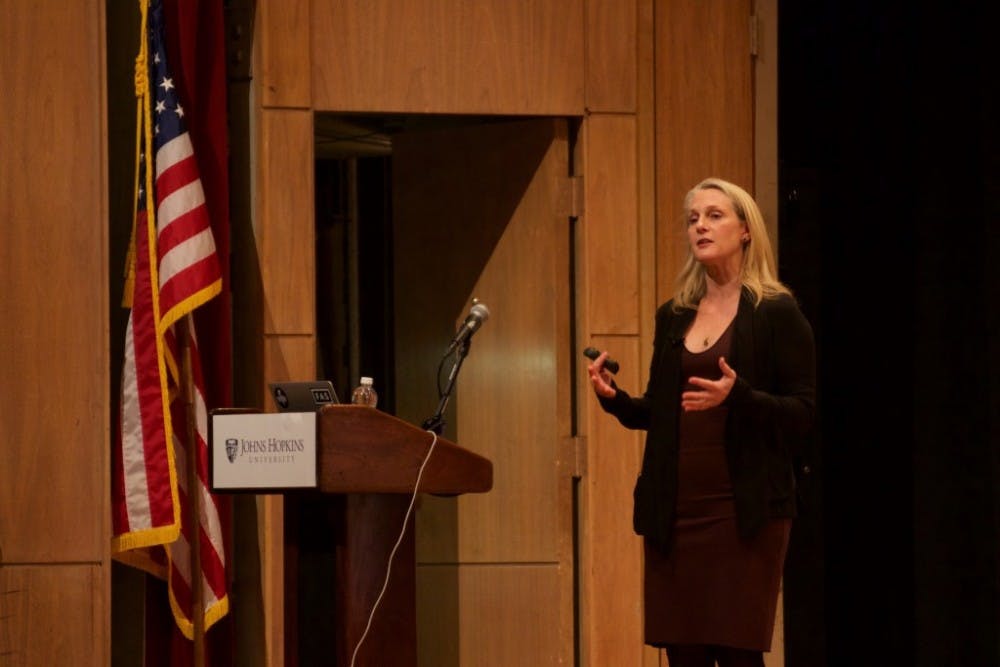Piper Kerman, the author of Orange is the New Black: My Year in a Woman’s Prison and a prison reform advocate, spoke in Shriver Hall Wednesday night as the first speaker of the 2016 Foreign Affairs Symposium (FAS).
Kerman spoke about three improvements that could help transform the criminal justice system: common sense sentencing that minimizes incarceration time, court and jail reform, and bettering the treatment of child offenders in the system.
Kerman never expected to end up in prison when she was growing up.
“I come from a very ordinary, middle class family. I was raised in Boston, a safe and stable home. Both my parents are teachers; I was lucky to get my education at such a great place,” she said. “And yet, despite all this good fortune, I still walked into a somewhat uncertain future when I walked in that college graduation.”
She was the type of kid who hung around after graduation and tried to figure out what her next step would be. During this period she crossed paths with a woman who she considered sophisticated and worldly.
“And she turned out to be more sophisticated than I understood because she was involved with selling narcotics,” Kerman said. “And rather than run in the other direction, as perhaps, self-preservation might suggest you do, I instead followed her around the globe to places like Bali and Zurich, places that seemed unimaginably exciting to me. And in following her, I thought I might find a great adventure of some sort. And, of course, what I found myself in was a great deal of trouble. I found myself in way over my head.”
The woman one day urgently requested she bring money from Chicago to Brussels. Without hesitating, Kerman agreed. After delivering the money, she realized she had crossed a dangerous and potentially consequential line. This realization drove her to move to Los Angeles, where she found Smith alumnae and tried to forget her past transgression.
“As every year passed, that crazy experience seemed to recede a little bit more in the rear-view mirror,” she said. “But the consequences of our actions are always going to come back to us in one way or another.”
Kerman’s crime caught up with her when she moved to New York and two federal agents knocked on her door to tell her she had been indicted in federal court in Chicago and had to appear at her arraignment.
“This began my journey through the American criminal justice system, or at least a portion of it, a system, ironically, that I didn’t know a lot about,” Kerman said. “I really recommend, if you have big transgressive moves that you’re thinking about, understand the sanctions you face.”
Kerman was sentenced to 15 months in prison at the Federal Correctional Institution in Danbury, Connecticut. She was released two months early, spending 13 months in prison. She informed the audience of different facts about prison in America. The United States contains 5 percent of the world’s population, but a quarter of the world’s prisoners, and a third of world’s female prisoners.
Her first few days in prison were, as women told her they would be, difficult. When she first arrived, women would ask if she needed items like toothpaste and shower shoes. The prison did not supply those items, often considered ‘unnecessary.’ They had to be bought from commissary, and prisoners did not receive commissary money until a few weeks into their stay.
“Look, today is a really bad day,” one prisoner told her. “Tomorrow will be a tiny bit better.”
“The last thing I expected on my first day in prison was to experience kindness at the hands of the other women,” Kerman said.
From her positive experiences with the women in prison, she wrote her book so that people would have a more accurate view of prison and to help the general public see prisoners as people rather than as criminals.

“I thought it was important to invite the reader to put themselves in my shoes or in shoes of one of the other women who is depicted in the book. And it’s hard to do because we kind of resist identifying with felons, criminals, convicts, all of the different words we use to describe those 2.4 million people who are locked up,” Kerman said. “I hoped that by talking about what I experienced and what I witnessed that someone might come away from the book with a different idea about who’s in prison in this country… and why they’re there.”
She wanted her book to have elements of “pop culture” so people would be more likely to read it.
Kerman explained the forms of punishment women can receive once in jail. Each jail has rules, and if they were broken, a woman could find herself in solitary confinement. Solitary confinement could be issued for committing assault in prison, or breaking a more minor rule, and Kerman called it a kind of torture. Kerman has testified twice before Congress on the subject of solitary confinement.
Kerman discussed the function of prisons and jails in today’s society.
“Prisons and jails are tools of social control, and we as a society choose to use them on segments of the population but they are not equally applied or distributed as tools,” Kerman said.
For Kerman, the prison system is inherently unjust, and she cited race and socioeconomic status as factors.
“Different Americans will be policed differently. They will be prosecuted differently. They will be punished differently,” Kerman said.
For example, she cited data that black Americans are four times more likely to be arrested for possession of marijuana than white Americans.
To make prison time less crushing, the women sought different forms of entertainment. Kerman chose to run laps around the prison’s track. She also partook in prison cooking, where she learned to make prison cheesecake. A popular activity was crocheting because the tools for it were sold in the commissary. Some women made blankets and auctioned them off.
“Prisoners seek ways to channel their energy into something productive,” Kerman said.
The women found comfort in each other and built friendships to help survive their confinement.
“There’s a level of intimacy that gives you a clear sense of what people are capable of, both the good and the bad,” Kerman said. “You must figure out how you fit into the social ecology of this place.”
She also highlighted the importance of staying in touch with family and friends on the outside. Mail-call was an anticipated time of day because it was a sign for inmates that the outside world and their loved ones hadn’t forgotten about them.
She explored the interplay between gender and power.
“In every prison that I’ve spent time in and there were three, the staff is overwhelmingly male and the prisoners were all female,” she said.
Students, including Junior Allie Gottlin, had a positive reception to her speech.
“Piper Kerman is truly an inspiring person,” she wrote in an email to The News-Letter. “She is someone who can take her devastating prison sentence and turn it into advocating for justice and prison reform. Her book and TV show have been able to reach millions, and she continues to inspire all those around her.”
Junior Charlie Green praised Kerman’s discussion of women in prison.
“She eliminated a lot of stigma and mystery involved with women going to prison,” Green wrote in an email to The News-Letter. “She talked about having women help her and welcome her in when she first arrived, and talked about issues with the prison system in America.”
Abby Biesman contributed reporting.





